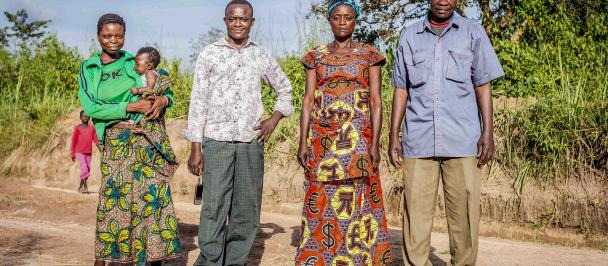Remarks by Crisis Bureau Director Asako Okai at the High-Level Event on Preventing Atrocity Crimes: the role of countering and addressing hate speech Moderated Discussion, as part of UNDP Development Dialogues: Rethinking solutions to crisis in the Decade of Action.
Preventing Atrocity Crimes: Countering and Addressing Hate Speech
March 5, 2021
Distinguished panelists, colleagues, partners from across the world,
Welcome to this discussion on the role of countering and addressing hate speech on preventing atrocity crime, organized as part of “UNDP Development dialogues: Rethinking solutions to crisis in the decade of action.”
A sincere thanks to Ms. Alice Nderitu, UN Special Adviser on Genocide Prevention, and all distinguished panelists who will enrich our discussion today and our skilled moderator Mr. Fernand de Varennes, Special Rapporteur on Minority Issues.
This event is jointly organized by UNDP and UN Office on Genocide Prevention and the Responsibility to Protect. We see this event primarily as a way to elevate the critical need for multi-stakeholder collaboration to implement the UN Strategy and Plan of Action on Hate Speech. UNDP strongly support the UN Strategy on Hate Speech, therefore its Plan of Action as well as for Religious Leaders and Actors to Prevent Incitement to Violence that Could Lead to Atrocity Crimes.
We look forward to this event being another step along the road of even closer collaboration.
The past and present taught us painful lessons of indifference, inaction, or inadequate action. ‘Never again’ – in some cases, remains an aspirational goal. The UN recognizes the undeniable and consequential role hate speech plays in promoting violence, from violent extremism to atrocity crimes. Hate speech evolved in complexity and scope. The widespread use of social media has given hate speech a larger audience online. This led to dehumanization of the other. We consider this a form of cultural violence, which pushed many ordinary people to glorify and commit violent action against other people.
We need to make sure that whoever is being subjected to hate speech, is protected and supported. We need to come together to empower the voices of those victims and amplify the voice of peacebuilders.
With your support as partners, UNDP is addressing hate speech, as well as misinformation and disinformation across 72 countries in five regions through three main trajectories. We have come a long way, but there is still room for improvement.
First, we need to significantly increase awareness of the impact of hate speech on societies and monitor better. Currently, various methodologies for sentiment analysis and hate speech monitoring are developed and utilized to understand grievances driving hate speech, as well as the instigators and outlets of hate speech. The support of our national stakeholders is critical in collecting data and building early warning systems. To consolidate data, we developed in-house capabilities at country and global levels called crisis risk dashboards. The dashboards are utilized by Peace and Development Advisors to serve UNDP Country Offices and UN Country Teams to translate the early signs into action. We look forward to working with partners to go beyond early warning, by creating early response systems to prevent atrocities from occurring.
Second, we need to scale-up programmes to address the drivers and root causes of hate speech. UNDP supported digital civic education, critical thinking and capacity for community engagement and intercultural dialogue in offline and online spaces. UN staff working on peace and development are at the forefront of discussions between key stakeholders to explore human rights-based responses to hate speech, as well as relevant legislative and policy reform. But these efforts need to be better connected to prevention of violent extremism, social cohesion and peacebuilding work at large, if we are to address the grievances that incited hate speech.
Third, with our partners, we need to amplify alternative and positive narratives to counter hate speech. Using technology, the role of culture and faith can reinforce the power of unity in diversity as the foundation of a cohesive, peaceful society. The arts and storytelling must be further leveraged, as can be seen in the examples of our #ExtremeLives and Creators of Change initiatives that engage creative individuals.
To tackle these deep-rooted problems, we need to further expand and step up partnerships to wider stakeholders for sustainable impacts. We also need to be creative, tech-savvy and contextually aware.
As we engage civil society actors, in particular youth, the needs are evident for supporting educational processes that help young people navigate a polarized and deceptive information environment online.
We also need to prioritize religious minorities, to provide guidance in combating hate speech for targeted and effective interventions. UNDP is addressing the challenges faced by minorities by reviewing and reforming laws, policies and practices that perpetuate stigma, discrimination and incitement to violence. We will strengthen our collaboration with parliamentarians to address hate speech in 2021 by providing more systematic guidance.
Central to this work is alignment with human rights principles. In collaboration with the Special Rapporteur on the Promotion and Protection of Human Rights and Fundamental Freedoms while countering terrorism, we need to ensure human rights are at the heart of our work to prevent violent extremism and combat hate speech.
These are directions that UNDP intend to step up our efforts to combat hate speech. Today we are joined by panelists from diverse background who will inform us of the local contexts. Today’s discussion will help us think through how we can continue to work together during 2021.
Thank you to all participants today for joining in. Let us embark on this important journey towards a more peaceful future.

 Locations
Locations




